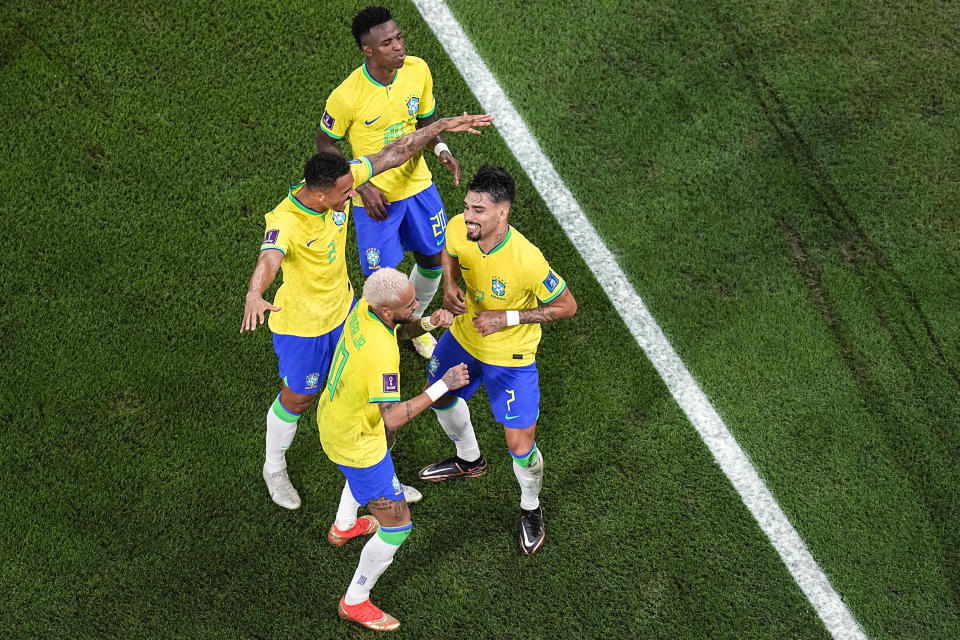Brazilian funk is the soundtrack of the World Cup on TikTok, despite the team’s loss
It was goodbye for one of soccer's most adored national teams.
Brazil, five-time World Cup winners, lost to Croatia in the quarterfinals on Friday. Despite the disappointment, the "Joga Bonito" team definitely started something off the field.
In one of TikTok's latest trends, the Brazilian team's love of dancing, flair and adoration of funk carioca, also known as favela funk or baile funk, has inspired a new generation of listeners on the platform.
Funk carioca is a hip-hop subgenre that draws on an array of international music genres including Afrobeat, samba, Miami bass and electro, among others. It emerged from Brazil in the late 1970s from funk parties, or large outdoor gatherings held in the favelas of Rio de Janeiro that featured funk songs, R&B and U.S. soul music.
While the musical style is already popular in Brazil, TikTok videos related to edits of the Brazil team's goal celebrations, dances, cultural moments and memes has ushered a new craze.

Videos with the hashtags Brazilian funk have gathered more than 94.7 million views; Brazilian music has reached more than 46.9 million views; and Brazilian dance has received more than 121.8 million. The hashtag funk carioca has more than 540 million views by itself.
Brazilian midfielder Lucas Paquetá, forwards Richarlison and Neymar Jr. are often featured dancing in the edits, along with their national teammates to popular songs on the platform like "Se Você Não Quer Passa a Vez" by MC Delux & DJ Guih Da ZO, or MC L Da Vinte and MC Gury's "Parado no Bailão," among other hits.
It's extended beyond soccer as slideshows, lifestyle, food and other unrelated types of videos use the music style.
There have been almost a million posts using "Parado no Bailão" alone. MC Fioti's "Bum Bum Tam Tam (KondZilla)" has more than 370,000 posts featuring the song, and "Tubarão Te Amo," a song by DJ LK da Escócia, MC Ryan SP and Tchakabum, has more than 568,000 posts with the song.
While dancing after celebrating a goal is nothing new, the Brazilian national soccer team's dances and celebrations are deeply rooted in the country's culture and the sport's history. They have drawn widespread criticism in the past as being disrespectful toward opponents.

The music's rise in popularity on TikTok can be traced to September when Real Madrid forward Vinícius Jr., who's Brazilian, was the subject of criticism and racism after a pundit said he wasn't respecting his opponents with his celebrations, comparing his behavior to a monkey. This was followed by fans from a rival Spanish soccer team recording racist chants ahead of a game.
The soccer world came out in support of Vinícius. Pelé, regarded as one of the sport's greatest players, backed the forward. “Football is joy. It’s a dance. It’s a real party. Even though racism still exists, we will not allow that to stop us from continuing to smile,” he wrote on Twitter at the time.
"I will not stop dancing," said Vinícius in a response video posted to Instagram in September, adding that the dances are not his and are intended "to celebrate the cultural diversity of the world."
Brazil may have lost on Friday, but the country that made Bossa Nova and Brazilian jazz a household name now has a new generation dancing to a Funk carioca beat, as longtime music fans are noting on social media.
I have been hearing Brazilian Funk for a long time and now everyone wants to talk about how good it is now! NOW?!!!!
— ARIES GROOVE 🪩 (@itsevelynbitchh) December 9, 2022
That Brazilian funk dance on tiktok has me in a chokehold
— Sli’merre (@RenRicch00) November 24, 2022
I’m actually TOO hyped for them today!🇧🇷🇧🇷 I realised TikTok has spent WEEKS conditioning me to get super excited for them🤣 Brazilian funk, Paquetá celebrating, Neymar edits and those kids dance battling never leave my tl😭 I love it! pic.twitter.com/QL4aP2w5nF
— S (@siyom__) November 24, 2022
This article was originally published on NBCNews.com

